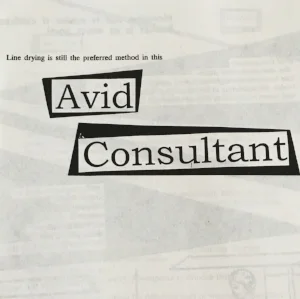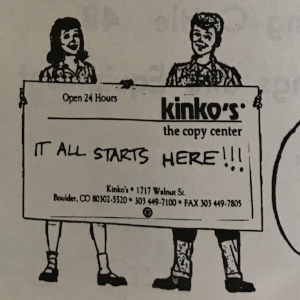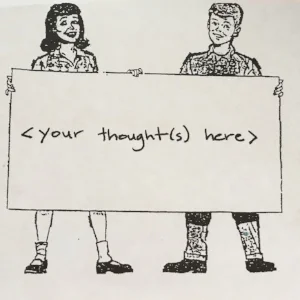Samples from Anodyne - "And we always finish with the end."
end·ing
ˈendiNG/
noun
an end or final part of something, especially a period of time
More
the furthest part or point of something.
"a nerve ending"
Tape Extracts:
Julie, Shapiro: Yeah. I mean it is really for the 28 people that will get this in the mail. The timing and the pace, it doesn't, there's no time you know there's no strict deadline or timeline for this ever. It's really my own making of a structure for how quickly it goes out.
I would like to open it back up to people expressing interest so I can send out the signs. I mean I love the fact that it can't be done instantly and someone can't just take a picture or something and send it to me in an e-mail. That's not enough, right? They have to express interest, I'll send it out to them usually pretty quickly. They send it back whenever.
And maybe I'll do one or two issues a year depending on who gets in touch and how quickly I get responses back. So, but I think at least one year going forward is a pretty safe bet.
Garrett: I suppose I should have said...One. Two.
Garrett (on phone): So this is like the end of a little over a year.
Julie: It's been a long time.
Garrett: And we always finish with the end. And then we will crack up because we will both know that there is no such thing. As the end.
Julie: Yeah, definitely. I think I can do that. I'm going to try to print them Monday and then it's just a matter of literally getting or buying enough. I can't steal any more of my dad's envelopes, they are not big enough, so I have to actually go buy some envelopes, that's fine.
Garrett: Shoved unconsciously, but systematically in-between a sun visor on the driver's side. I have no idea where most of them lead to. Although they once delivered me. Maybe to your house. If that's the case you can probably expect me again at some point.
Julie: I will admit it's been a while since we talked the first time and I had grand visions of putting out the paper version of Anodyne Redux like by the end of the year, by the end of 2016. And lo and behold it's eight or nine, nine. OK. Let's call it, it's nine months into 2017 and I have countless times looked at that folder of signs that have come in through the mail and thought NOW is the time to put these on paper. But, the truth is things got busy. We moved, we bought a place, like life just totally exploded on top of our normal workflow. And so I hadn't really yet gotten around to making the paper version. And you know it was not until you sent me a note to say hey this is coming together. Things are looking like we'll be ready to release you know in a few weeks. That made me realize how much I really wanted to have that paper version done and to follow through on that claim that I was going to do it and the promise I'd made to participants.
Garrett: Blue apartment, house upstairs. A funny sculpture. Chair out front. This issue was meant to be read aloud, not necessarily to anyone else. Lets read and find out.
Garrett (reading e-mail from Julie): Remember about a year ago when you expressed interest in my 20 years later revived zine; and I sent you an illustration with two kids holding up a sign? You filled in their sign with whatever was on your mind and send it back. Do you remember? Do remember I promised you would one day receive something in the mail for your efforts? That day is quickly approaching, but since it's been so long I thought I should double check.
Garrett (on phone): What was it about the...Me getting ready to put out the audio that sort of made that happen do you think? Was it just the sort of that there would be audio saying you were going to do it.
Julie: It was partly listening to some of the drafts and hearing myself talk about how much I enjoyed doing it and I was like oh yeah I really enjoyed doing it a lot. And what was cool was I already had already really thought out what I wanted to make. So it was really just a matter of like spreading things out, putting them together and gluing signs onto a piece of paper. And I realized I would totally enjoy doing that.
So I just, you know, in one night just mocked up both sides of the poster sized version that, small poster size version that I'm going to make and it felt as great as it always has to like sit there at my kitchen table late at night with my son's glue stick and put this together and think about mailing it out. How would I package it? You know would I look for envelopes that would fit the whole poster or am I gonna fold it and if I fold it should I lay it out according to where the folds would be? And all these things so. I usually choose the path of least resistance and think it's just paper, it can get folded and unfolded as many times as it needs to.
And you know, the big question is do I make color copies or stick with the old black and white? So I've not made that decision yet. But yeah I was just like sitting down and doing it and totally enjoying doing it again.
Garrett (on phone): Well and I notice on the Tumblr you've added a couple more and then I noticed you changed around the description of it that's sort of highlighting the paper version for real.
Julie: Yes, it's seeming more real. Well one thing is I had a couple of signs hanging out in my incoming mail pile that have been there for months so the signs came a while back I just hadn't processed them through the system of putting on Tumblr and then adding them to the pile to be put onto the paper version so, that little kind of...I'm always tinkering too. So no matter. You know every time I look at the tumblr site I want to change it.
I actually added more text there because I was trying to balance the line breaks. I didn't have any control over the line breaks and it was bothering me that like it was one long line with two or three other words on the next line so I was just trying to outsmart Tumblr.
Garrett: So many seeking direction and insisting we are not. I can sense it in his shoulders as we walk silently to the river. Grooming our hunches separately. Watch it in her wrist as she opens a bottle and hands it to me sighing $2.50. I read it in words that have arrived from the other side of the planet. Words describing temples and vulnerability and filth. My self-seeking. There is panic involved. Carefully placed in the corners of eyes. Their spontaneous, adamant need for reassurance. The right recipe. For direction.
Julie: It's funny how it worked out. I was thinking that initially I would put out 30 or 40 at a time per issue because I guess this could be ongoing still. And I had 28 signs so I had 2 gaping holes. So I actually gave a sign to my 6 year old to fill out and I plan to sort of write in the space with the last one so it just worked out perfectly in terms of what I have to work with and what I want to make out of it.
Garrett (on phone): And so are you thinking it'll be more like a broadsheet sort of poster or are you going to try to fold it all together into something.
Julie: Yeah, total broadsheet, two sided, differently oriented. And then I'll just sort of fold it in half and send it out I think. But it's funny because it will end up being pretty much the same shape as the zine which is pretty square. Yeah, I think it was pretty square actually. So the packaging will not be that different from when the zines went out.
Garrett: How hard is it to exit my head. To listen to my body. To trust my instinct. Immense difficulty in letting direction find me and relinquishing the search.
5. I'm not as afraid as I thought I'd be. Crashes in the night, movement in the shadows. It's dark out in the woods. Miles away from the cafes and bookstores. When the moon leans toward fullness, distant flashlight in the icy cold of space. Direction sprawls out in front of me. Warning against the ruts as we troop home. Wine stains on my shirt. Who needs purity in the deep woods?
Julie: Um...I don't know, I guess like my...the thing is like, I guess I look back and think it was so easy. I really spent just a couple hours putting the sides of the poster together. So, you know, that could have been done at any time, but I really had to be mentally ready for it in some way, and ready to take it on, and it just hadn't been until this weekend and I realized I was like totally ready and that probably has a lot to do...I mean the way Anodyne has always been a reflection of where I'm at in my life. That just feels like another perfect. It still feels so true. I was so happy to realize it's still something that gives that back to me, that it always has been a sort of companion, in different times for different reasons and it was just it was sort of like Hello old friend, let's sit down and put you together tonight.
And it's not a task, it's not an obligation, it's just something I really want to do you now. And I'm really excited to line them all up and put the stamps on, probably with Phine again because he helped me mail out the signs to begin with. And like, I look forward to the process, I look forward to people getting them. And , you know, ultimately look forward to doing the next round.
Garrett: The signs, the arrows, the indicators; they're directions, but I still don't know where to go half the time.
Garrett (on phone): Are you feeling any different about the process being where you are right now? Or does it feel like you're kind of being put back in time?
Julie: Looking at my handwriting is odd, It's just odd to write. You know I actually, I wanted to thank everyone so I wrote their names out that will go along one side of the poster. But, I wrote them out a couple of times to understand how much space that would take. And I used to just eyeball that and it would be fine. I'm a little rusty on that account.
But, I also felt a little nervous about putting something down because it would be permanently on each sheet. So, there was a little bit more trepidation. And we're so used to editing our own words and you know that Delete delete delete button and cut and paste and you know that's really not part of this process. So that was, I was very conscious of how different it is than writing on a screen.
Garrett: Security of guidance. The safety of visualization. The lure of gaging.
Julie: Be like one paragraph of you know something and I wrote, I hand wrote that out and then started scratching things out and you know arrows and this and that and I had thought about sitting down at my computer to type it out first and then just transcribe it onto paper. But I thought No I'm gonna actually I'm gonna put the whole process out there in front of myself and that was challenging. But, you know, I think I like what I came up with I never. I'm waiting a few days till I actually commit it to the actual poster, but I think it got there in the end. But, it's a mess. It did not come through that first time at all.
Garrett: Stop with orange windmill urban sculpture type thing closer pass fire station.
Julie: I will say that once I got into the rhythm of like arranging the signs and thinking about the visuals on the signs and the words versus pictures and wanting that to kind of be intentionally laid out, that part felt great you know just having that tactile hands on moving the signs around and eventually gluing them all down and figuring out how much you know the pattern the glue stick on the back and how much glue a piece of paper needs to stick. I haven't really thought about that in a long time. And and just, I just enjoyed that so much, getting into the rhythm and you know there are 28 signs to glue So it was very repetitive and I WAS thinking about the fact I was listening to a podcast and that was very different because I used to always just have music on.
Garrett (on phone): What were you listening to?
Garrett: Feel free to choose some direction. And take it. Tell me what happens.
Julie: I wonder if, should, could we do. Should we do a call out just for people who want a sign?
Garrett (on phone): Yeah.
Julie: OK.
Garrett (on phone): Absolutely.
Julie: Because that would be fun if people hear the series and ultimately want to contribute. So if anyone who heard this series actually would like to contribute to the eventual issue two, episode two, I said it yet again, issue two of Anodyne Redux they could just send me a simple email jatomic@gmail.com and tell me that they're interested. I'll just need a mailing address and they'll get a sign in the mail you know within a week or two.
And they can, you know, to get a taste of the signs that they've been hearing about and see past ones those are at anodyneredux.tumblr.com.
Garrett: 7. The end.
Julie: You know maybe it'll be a little steadier now. Maybe it won't. You can look me up in 20 years again. Maybe I'll be ready to put out the second Anodyne Redux.
Garrett (on phone): We'll do another recap.
Julie: Yeah, why not?







